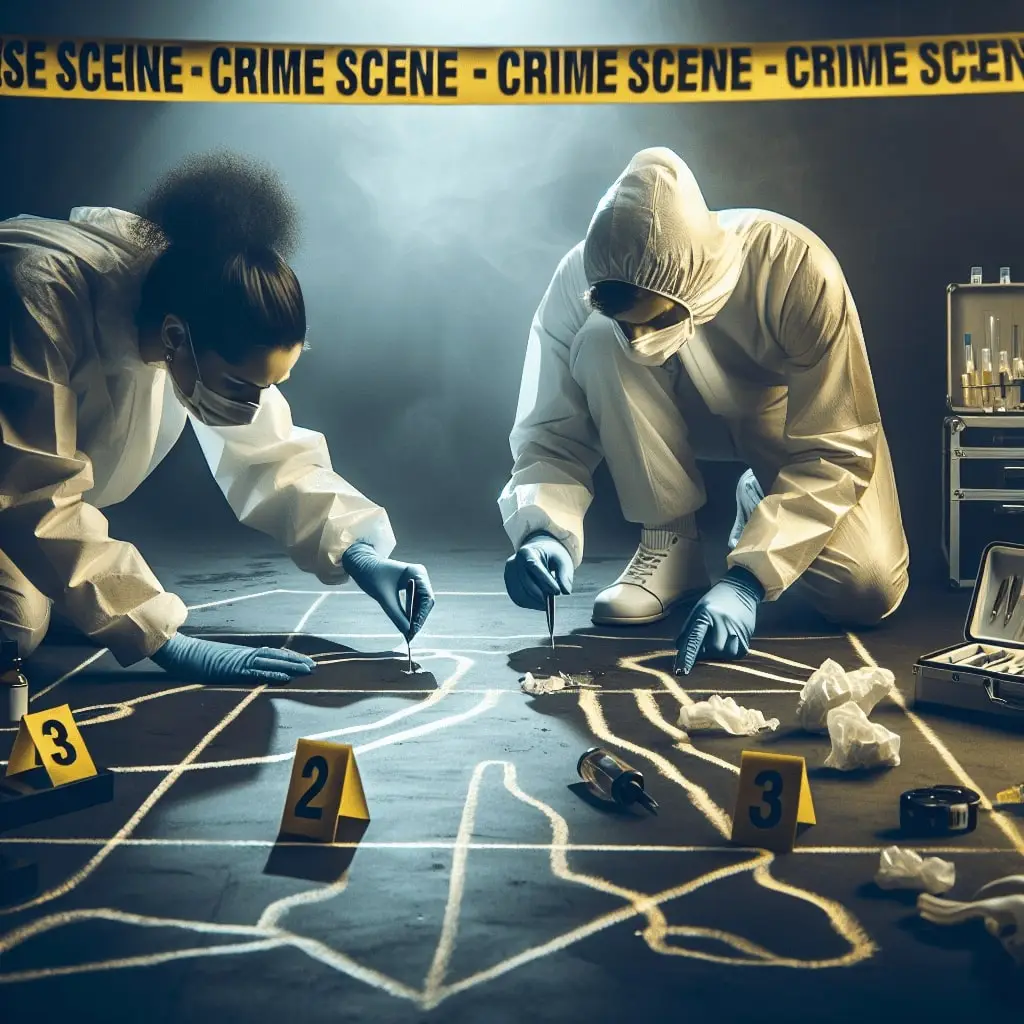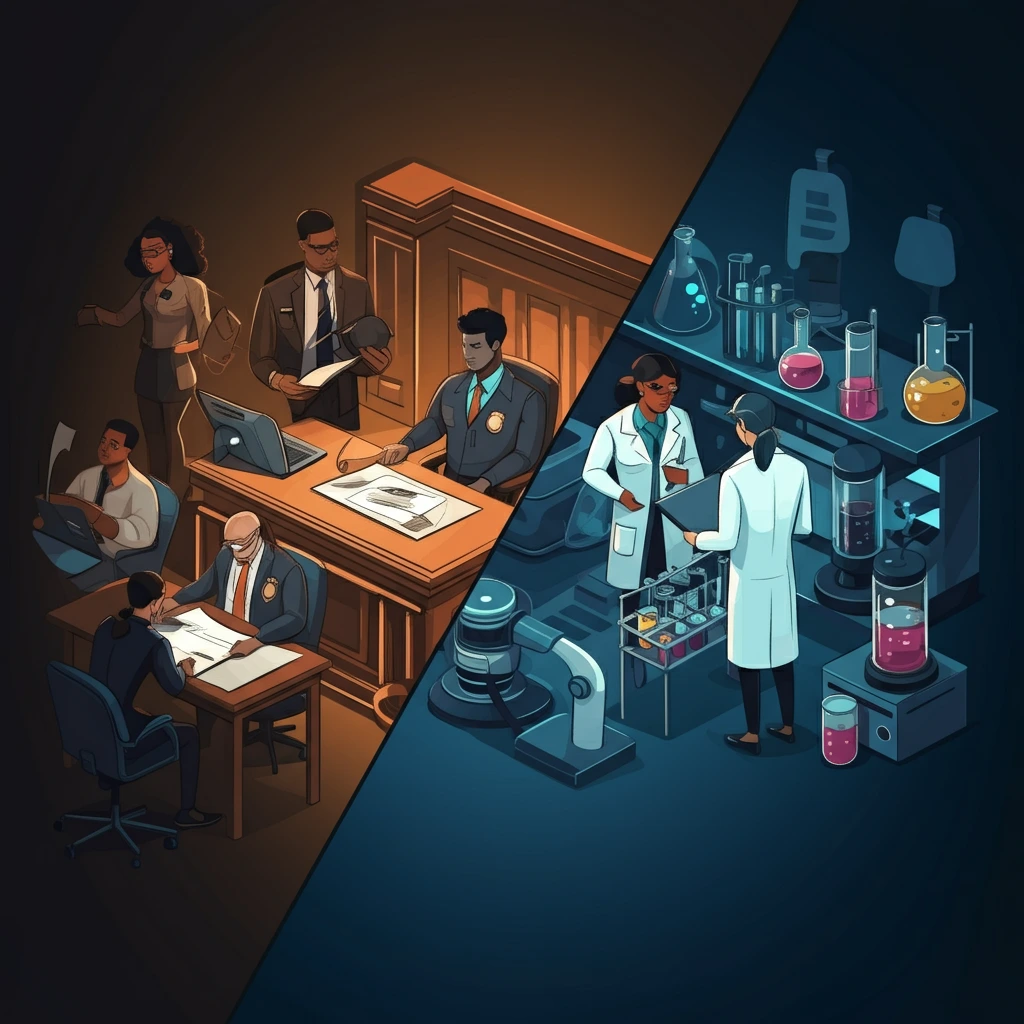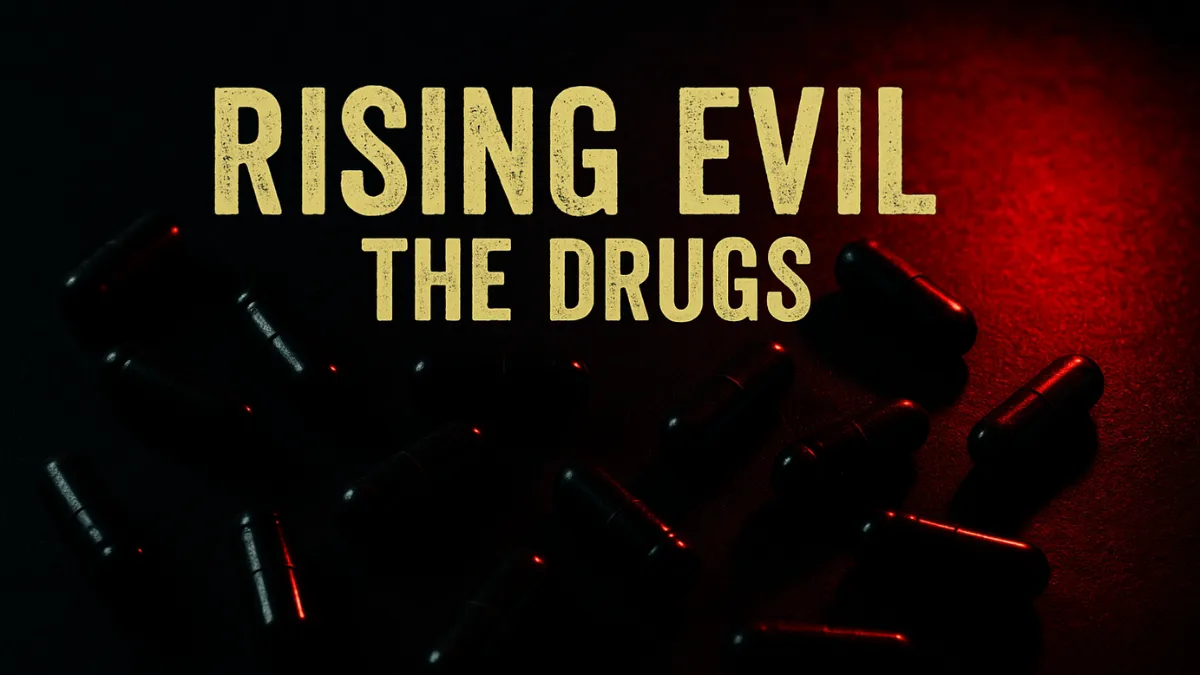Last Updated on May 20, 2025 by Nyayik Vigyan
The intersection of criminology and forensic science is a fascinating realm. It’s where the study of crime meets the application of science to solve criminal cases.
Criminology delves into the nature, causes, and control of criminal behavior. It seeks to understand the complex dynamics of crime and its impact on society.
On the other hand, forensic science applies scientific principles to gather and analyze evidence. It’s a crucial component in the pursuit of justice, providing tangible proof to support or refute theories about a crime.

Image Credit: Image generated using AI
These two disciplines, though distinct, are deeply intertwined. They both play pivotal roles in the criminal justice system, each contributing unique insights and expertise.
For students and professionals interested in these fields, there are various educational pathways. From a BSc in Forensic Science and Criminology to an MSc in Criminology and Forensic Science, the options are diverse.
There are also numerous career opportunities at the crossroads of these disciplines. From crime scene investigation to criminal profiling, the possibilities are vast and rewarding.
But what does it really mean to study and work in these fields? What can one expect from criminology and forensic science courses? What are the real-world applications of these disciplines?
This article aims to answer these questions and more. It provides a comprehensive overview of the intersection of criminology and forensic science. It explores the symbiotic relationship between these fields, the educational pathways, and the career opportunities.
We’ll delve into the practical aspects of crime scene investigation and criminal profiling. We’ll also discuss the role of technology and ethics in these fields.
So, whether you’re a student considering a career in criminal justice, a professional seeking further education, or simply curious about how these fields contribute to solving crimes, this article is for you.
Join us as we explore the fascinating intersection of criminology and forensic science.
The Symbiotic Relationship Between Criminology and Forensic Science
Criminology and forensic science are complementary fields. Together, they form a critical partnership in crime solving and criminal justice. Each plays a distinct role, yet their combined efforts lead to more effective outcomes.
Criminology focuses on understanding criminal behavior. It examines why crimes occur and how they can be prevented. This involves studying social patterns, psychological factors, and policy implications.
Forensic science, in contrast, is about applying scientific techniques to gather evidence. It provides the hard data needed to support criminological theories and investigations. Techniques range from DNA analysis to digital forensics.
These two fields overlap in many practical applications. For example, in crime scene investigation, criminologists might develop theories about a suspect’s behavior. Meanwhile, forensic scientists collect and analyze physical evidence to support or refute these theories.
Collaboration between the two fields is essential. Criminologists rely on forensic evidence to validate their models and hypotheses. Forensic scientists, in turn, gain context from criminological insights, which can direct where and how they look for evidence.
This interaction is crucial for a balanced justice system. Criminology provides the framework for understanding crime. Forensic science delivers the tools and evidence to corroborate it. Together, they ensure a comprehensive approach to criminal investigations.
Criminology Studies: Understanding Crime and Criminal Behavior
Criminology studies delve into the intricate dynamics of crime. They focus on both individual and societal influences. This provides a holistic view of criminal behavior.
This field examines the reasons behind criminal actions. Researchers explore psychological, biological, and social factors. This helps in identifying patterns that lead to criminal activities.
Understanding the underlying causes is critical for prevention. Criminologists develop theories that guide public policies. These policies aim to reduce crime rates and improve community safety.
One key focus is the analysis of crime trends. These studies help in identifying at-risk groups and areas. Addressing these can significantly lower the likelihood of crime.
Criminology also explores the effectiveness of the criminal justice system. It scrutinizes the ways laws are enforced and justice is administered. This evaluation is crucial for reforming and improving legal practices.
Through rigorous research, criminology continually evolves. It adapts to new findings and societal changes. This flexibility ensures that criminology remains relevant in addressing contemporary crime challenges.
The Science Behind Crime: An Overview of Forensic Science
Forensic science brings precision to crime-solving. It involves the application of scientific methods and techniques. These methods analyze and interpret evidence collected from crime scenes.
One of its core functions is to establish connections. Forensic experts link physical evidence to suspects. This includes fingerprints, DNA, and other trace materials.
The field is vast and covers various specialties. Each specialty contributes uniquely to investigations. For example, forensic toxicology focuses on identifying drugs and poisons.
Advancements in technology have propelled forensic science. Tools like digital forensics are now essential in combating cybercrime. These developments enable more efficient and accurate analyses.
Forensic science is crucial in the judicial process. It provides objective, scientific evidence that can confirm or refute allegations. Its role in the courtroom aids in establishing facts and seeking justice.
Educational Pathways: From BSc to MSc in Criminology and Forensic Science
A career in criminology and forensic science requires solid educational grounding. One common starting point is a Bachelor of Science (BSc) in Forensic Science and Criminology. This degree provides a mix of theoretical knowledge and practical skills, setting the foundation for understanding crime and evidence.
The BSc curriculum usually includes criminology theories and forensic techniques. It covers areas like evidence collection, analysis, and interpretation. Students also learn about the legal aspects of evidence handling.
For those looking to deepen their expertise, a Master of Science (MSc) in Criminology and Forensic Science is an excellent option. The MSc program offers advanced courses. These might include specialized forensic disciplines or current trends and technologies in the field.
Diploma programs in forensic science and criminology offer another educational avenue. These courses are shorter and more focused than degree programs. They provide practical skills that are often appealing for entry-level positions or career shifts.
Graduates from these programs find numerous job opportunities. They can work in various sectors, including law enforcement and legal firms. Further studies or professional certifications can enhance these prospects.
Here’s a summary of key educational pathways:
- BSc Forensic Science and Criminology: Covers foundational theories and practices.
- MSc Criminology and Forensic Science: Offers advanced study and specialized courses.
- Diploma in Forensic Science and Criminology: Provides practical skills for quick entry into the field.

Image Credit: Image generated using AI
Each pathway offers unique benefits and career opportunities. Choosing the right one depends on individual goals and interests. With the right education, students can enter a field where science meets justice.
Forensic Science and Criminology Courses: What to Expect
Forensic science and criminology courses provide a diverse and challenging curriculum. Students delve into both core subjects and electives. This mix allows exploration of various fields within forensic science and criminology.
Core subjects often cover principles of criminal justice, forensic techniques, and criminology theories. These foundational areas give students essential knowledge. Through electives, students can explore specialized interests like forensic psychology or digital forensics.
Practical training is a cornerstone of these courses. Internships offer hands-on experience crucial for future careers. They help students apply classroom learning to real-world situations, bridging the gap between theory and practice.
Accreditation is vital when choosing a program. Accredited courses ensure a standard of education that meets industry expectations. This guarantees that students receive a quality education and are well-prepared for the workforce.
Internships and practical experiences strengthen a student’s resume and build skills. These opportunities provide insights into day-to-day responsibilities in forensic science and criminology jobs. They also help students build professional networks in their chosen fields.
Course quality heavily impacts career prospects. Quality programs have experienced faculty and updated resources. They reflect current practices and technologies, essential in these evolving fields.
Here’s a brief look at what courses typically involve:
- Core Subjects and Electives: Comprehensive coverage of essential and specialized topics.
- Practical Training and Internships: Real-world experience through hands-on learning.
- Accreditation and Quality of Education: Assurance of meeting industry standards.

Image Credit: Image generated using AI
This curriculum design prepares students for a dynamic and fulfilling career path. With the right educational foundation, they can excel in roles that demand expertise and precision. Proper training ensures they contribute effectively to solving crimes and furthering criminology research.
Career Opportunities at the Crossroads of Criminology and Forensic Science
Criminology and forensic science graduates find themselves in a unique position. They can pursue careers in diverse fields, making their skills highly valuable. Opportunities await them where these disciplines intersect.
Law enforcement is a natural fit for many graduates. They often engage in crime scene investigations, where meticulous attention to detail is crucial. Their education in forensic science equips them to gather and analyze evidence effectively.
Legal firms also benefit from their expertise, especially in criminal profiling. By understanding criminal behavior, graduates assist in developing cases. This insight is valuable for both defense and prosecution strategies.
Government agencies offer avenues for graduates to influence policy. Their criminology knowledge helps shape better crime prevention strategies. Working in policy development allows them to make impactful, large-scale contributions.
A strong foundation in criminology and forensic science can lead to varied roles. These roles include research, analysis, and application of forensic techniques. Professionals in this field are pivotal to the criminal justice system’s effectiveness.
Roles can range from analytical tasks to fieldwork. Students often anticipate roles in labs or at crime scenes. Both environments require precision, integrity, and adherence to ethical standards.
Here are some potential career paths:
- Law Enforcement and Crime Scene Investigation: Direct involvement in solving crimes.
- Legal Firms and Criminal Profiling: Supporting case development through behavioral insights.
- Government Agencies and Policy Development: Contributing to policy and crime prevention strategies.

Image Credit: Image generated using AI
Graduates must be prepared to navigate challenging situations. Their roles often demand quick thinking and adaptability. Despite the challenges, the rewards are substantial, as these professionals play a crucial role in upholding justice and improving community safety.
Crime Scene Investigation: A Real-World Application of Both Fields
Crime scene investigation (CSI) is a crucial aspect of criminal justice. It demands a blend of criminology’s theoretical insights and forensic science’s practical expertise. This intersection is where theory meets practice.
When a crime occurs, the first challenge is to secure the scene. This ensures evidence is protected from contamination. A team of trained professionals then steps in to meticulously gather evidence.
Forensic scientists play a pivotal role in analyzing this evidence. They use advanced techniques to examine DNA, fingerprints, and other physical clues. Their findings can lead directly to the identification of suspects.
Meanwhile, criminologists delve into the motives behind the crime. They consider psychological and sociological factors. This helps create a profile of potential offenders, complementing the forensic evidence.
Both fields must collaborate closely. Effective communication between forensic experts and criminologists ensures a comprehensive investigation. This teamwork often leads to breakthroughs in solving complex cases.
Criminal Profiling and Forensic Psychology: Delving into the Criminal Mind
Criminal profiling involves constructing profiles of suspects based on evidence. This process combines forensic science with criminological theories. Profilers analyze behaviors, patterns, and other indicators.
Forensic psychology adds another layer to understanding criminal behavior. It explores the mental state and motivations of offenders. Psychologists assess the psychological factors that may drive criminal acts.
Building a psychological profile requires evaluating numerous elements. These include personality traits, history, and possible triggers. Insights from criminology research often guide this process.
The role of technology in profiling is significant. Databases help track criminal patterns. Advanced software aids in analyzing complex behavior patterns efficiently.
Collaboration between psychologists, criminologists, and law enforcement is essential. This ensures profiles are accurate and comprehensive. Understanding the criminal mind helps prevent future crimes and aid in rehabilitation efforts.
The Role of Technology and Ethics in Criminology and Forensic Science
Technology is transforming criminology and forensic science. Advancements are reshaping how experts investigate and solve crimes. Digital tools provide new ways to analyze data and evidence.
Forensic science heavily relies on technology. Techniques like DNA profiling and digital forensics are now standard. These methods improve precision and speed up investigations significantly.
In criminology, technology aids in understanding crime trends. Geographic Information Systems (GIS) map crime patterns effectively. This helps in strategizing better prevention and intervention methods.
However, technology raises ethical concerns. Privacy issues arise with increased surveillance and data collection. Balancing security and individual rights is a complex challenge.
Ethical practices are crucial in both fields. Professionals must adhere to standards that protect personal privacy. Responsible use of technology ensures trust and integrity in criminal investigations.
Case Studies and Real-Life Success Stories
Case studies illuminate the practical impact of criminology and forensic science. They showcase how these disciplines solve real-world problems effectively. Each story demonstrates unique applications of theory and technology.
In one notable case, forensic science unraveled a complex murder mystery. Critical evidence, like fingerprints and DNA, was expertly analyzed. The meticulous work of forensic professionals led to a conviction.
Criminology’s role in profiling offenders has also been pivotal. One case involved profiling a serial offender based on behavioral patterns. This insight was vital in predicting and intercepting the criminal.
Technology-driven forensics have solved cases previously deemed unsolvable. Digital forensics recovered crucial evidence from encrypted devices. Such breakthroughs have been critical in bringing justice to cybercrime victims.
Real-life success stories inspire confidence in criminology and forensic science. They underline the dedication and skill of professionals in these fields. As technology evolves, more such successes are expected in the future.
The Future of Criminology and Forensic Science: Trends and Predictions
Criminology and forensic science are continuously evolving fields. Both are influenced by new technologies and methodologies. As we look to the future, several trends are emerging.
The integration of artificial intelligence is transforming forensic science. AI algorithms are increasingly used to analyze large datasets rapidly. This can greatly enhance the accuracy and speed of forensic investigations.
Additionally, digital forensics is becoming more vital. With the rise of cybercrime, expertise in digital evidence retrieval is essential. Professionals with skills in this area will be in high demand.
In criminology, there’s a growing focus on data-driven approaches. Researchers are using big data to understand crime patterns better. This aids in developing more effective crime prevention strategies.
Ethical considerations will remain crucial in both fields. As technology advances, maintaining ethical standards will ensure justice. The importance of ethics cannot be overstated for future developments.
Looking ahead, multidisciplinary collaboration will be key. The intersection of criminology, technology, and forensic science will foster innovation. This collaboration promises exciting possibilities for criminal justice.
Conclusion: The Vital Role of Criminology and Forensic Science in Criminal Justice
Criminology and forensic science are indispensable to the justice system. They provide the insights and evidence needed to resolve crimes. Together, they form the backbone of modern criminal investigations.
These fields offer clear paths for those interested in justice. Professionals in these roles help ensure that society remains safe and just. Their contributions are crucial for a fair and effective legal system.
Frequently Asked Questions (FAQs)
What is the difference between criminology and forensic science?
Criminology focuses on understanding crime and criminal behavior. It examines the social and psychological aspects of crime. Forensic science, meanwhile, applies scientific methods to analyze evidence and support legal proceedings. Each discipline plays a unique role in solving crimes.
How can I start a career in criminology and forensic science?
Begin with education in relevant fields. Pursue degrees in criminology or forensic science. Look for courses that offer both theoretical and practical training. Obtain internships to gain experience and deepen your understanding of real-world applications.
What are the latest advancements in forensic science technology?
Recent advancements have transformed forensic science. DNA profiling has become more precise and accessible. Digital forensics is evolving rapidly with new technology.
Tools for analyzing evidence, such as chemical and biological analysis, are constantly improving. These innovations enhance the accuracy and efficiency of investigations.
References and Further Reading
For those intrigued by the intersection of criminology and forensic science, several resources offer in-depth insights. Books such as “Forensic Science: An Introduction to Scientific and Investigative Techniques” and journals like “The Journal of Criminology” provide valuable information. Online courses and lectures further enhance understanding of these compelling fields.








